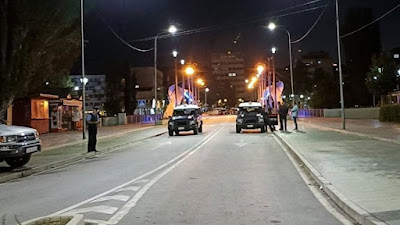A debate over Kosovan registration plates for automobiles, which people of the country's Serbian minority refuse to use, has reignited nationalism that risks turning combustible. This might lead to armed conflict.
A simple dispute over license plates for automobiles has the possibility of reigniting the conflict that has long simmered between Serbia and Kosovo, which might, in turn, reignite the conflict between these two Balkan nations. It is definitely a new cold war scenario that yesterday led to extremely high tension between Pristina and Belgrade. The first capital, Pristina, has the backing of NATO, while the second capital, Belgrade, enjoys the support of Russia under the leadership of Vladimir Putin.
In order to force the police to shut down two border crossings in Kosovo called Jarinje and Bernjak, protesters blocked the roads leading to those crossings by parking gravel trucks and other heavy machinery on the roads leading to those crossings. There are 50,000 Serbs living in the region, making up the majority of the population. The action was planned as a form of protest against the government's decision to force the Serbs living in the north of the country to request car plates issued by national institutions, as is the case for all other citizens, when at the present time they use plates and documents issued by the Serbian institutions and refuse to recognize the institutions located in the capital city of Pristina. This decision was made in response to the fact that the Serbs in the north of the country currently use plates and documents issued by the Serbian institutions. Additionally, the administration came to the conclusion that, effective immediately,
The administration in Pristina has made the choice to delay the decision for one month in order to reduce the likelihood of a significant escalation; yet, if it continues along this route, the level of tension may rapidly increase. Over one hundred nations acknowledged Kosovo's status as a sovereign nation, but neither Serbia nor Russia did so over the subsequent fourteen years after the province declared its independence. Kfor, which stands for the Kosovo Force, has been stationed in the country ever since the conclusion of the conflict in 1999. This NATO-led presence of around 3,500 personnel is there in accordance with resolution 1244 of the United Nations Security Council. The Italian Carabinieri, who make up the largest single unit in the contingent with 638 men, are also a part of it. General Luca Piperni, who is Italian, is now serving as the mission's deputy commander.
In 2013, the two nations, who were previously one, participated in a discussion that was sponsored by the EU in an effort to address lingering concerns; nevertheless, progress was dismal throughout this time. KFOR issued a statement saying that the general security situation in the northern municipalities of Kosovo is tense, and that it is "ready to intervene if stability is put at risk." The statement also assured that it is "closely monitoring" the situation, and that it is "ready to intervene if stability is put at risk."
Yesterday, the police said that bullets were fired "in the direction of the police units, but thankfully no one was hurt." Additionally, the police claimed that protestors had battered numerous Albanians who passed on the highways that had been closed, and that several automobiles were attacked. A similar situation occurred a year earlier, when local Serbs stopped the same routes over the issue of license plates. In response, the government of Kosovo sent special police troops, and Belgrade launched fighter planes along the border. Josep Borrell, the High Representative for EU Foreign Policy, "welcomed" the decision to delay the measures on the prohibition on the use of Serbian papers and plates until September 1 and emphasized that "'
Dmitrij instead said that "the conditions established by the Kosovo authorities for the process for issuing new papers are completely baseless." "We entirely support Serbia's stance," he added, adding "it is imperative that all parties engaged in the matter behave properly." According to Peskov, who is the spokesperson for Russian President Putin, "Belgrade's posture is constructive and peaceful." "Countries that have recognized Kosovo should use all of their influence to warn the Pristina authorities against ill-thought-out procedures that can increase tensions in the region," he added. "Pristina authorities should be warned against ill-thought-out procedures that can increase tensions in the region."
Edi Rama, the Prime Minister of Albania, referred to the escalation as "totally unreasonable," and he emphasized that "the Kosovo government has not only the right, but also the duty to apply the agreements by exercising its territorial sovereignty as an independent state and the agreements with the counterpart are made to be applied, not to be discussed." The Albanian Prime Minister said that "the Kosovo government has not only the right, but also the duty to apply the agreements by exercising its territorial sovereignty as an independent state." After then, Rama made a plea to the authorities in Belgrade, requesting that they do not in any way support the organizations that are opposed to the fulfillment of the accords.

